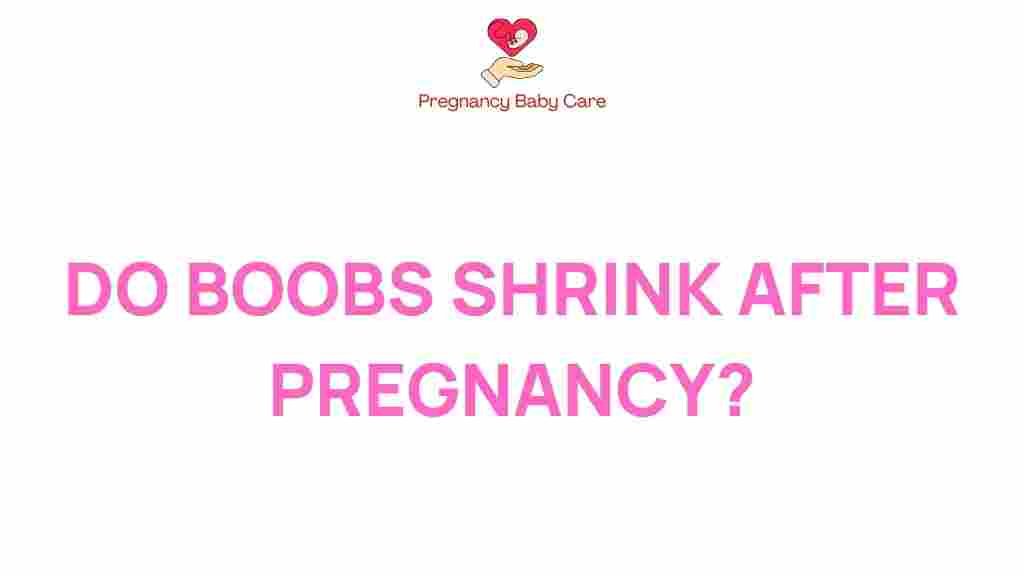Do Breasts Really Shrink After Pregnancy?
The journey of pregnancy is filled with numerous changes, both physically and emotionally. One common concern many women face is the transformation of their breasts during and after pregnancy. This article delves into the postpartum changes that can affect a woman’s body image, specifically focusing on whether breasts really shrink after pregnancy and what factors contribute to this phenomenon.
Understanding Breast Changes During Pregnancy
During pregnancy, breasts undergo significant changes due to hormonal shifts. These changes prepare the body for lactation and breastfeeding. Here are some key aspects of breast changes that occur:
- Hormonal Changes: High levels of estrogen and progesterone lead to breast tissue growth.
- Increased Blood Flow: Many women notice their breasts becoming fuller and more sensitive.
- Formation of Milk Ducts: The body prepares for lactation, resulting in enlarged breasts.
What Happens to Breasts After Pregnancy?
After the baby is born, the body begins to adjust back to its pre-pregnancy state, leading to various postpartum changes in breast size and shape.
- Lactation and Breastfeeding: During the initial months, breasts may remain larger and fuller due to milk production. However, once breastfeeding ceases, many women notice a change.
- Fat Distribution: The amount of fatty tissue in breasts can decrease, leading to a perceived reduction in size.
- Skin Elasticity: The skin around the breasts may lose elasticity, which can affect their firmness.
Do Breasts Actually Shrink After Pregnancy?
Yes, breasts can shrink after pregnancy, but this isn’t a universal experience. The degree to which breasts change in size can vary widely among women. Here are some factors that influence whether breasts will shrink after pregnancy:
- Genetics: Family history can play a role in how a woman’s breasts respond to hormonal changes.
- Age: Older women may experience more noticeable changes due to decreased skin elasticity and hormonal fluctuations.
- Weight Changes: Gaining or losing weight during or after pregnancy can also affect breast size.
- Duration of Breastfeeding: Women who breastfeed for longer periods may experience different changes compared to those who do not.
Myths About Breast Changes Post-Pregnancy
There are several myths surrounding breast changes after pregnancy that can contribute to negative body image among new mothers. Here are a few common misconceptions:
- Myth 1: All women will experience significant shrinking of breasts after pregnancy.
- Myth 2: Breastfeeding causes permanent sagging.
- Myth 3: Larger breasts before pregnancy guarantee larger breasts after.
Understanding these myths is crucial for women to maintain a positive body image and realistic expectations about their postpartum bodies.
Postpartum Body Image and Women’s Health
The body image of many new mothers can be affected by changes in breast size and shape. Women may feel self-conscious or dissatisfied with their bodies, which can impact mental health. Here are some ways to promote a positive body image:
- Focus on Health: Shift the focus from appearance to health and well-being.
- Seek Support: Joining support groups for new mothers can provide a sense of community and shared experiences.
- Consult Professionals: If feelings of inadequacy persist, consider speaking with a therapist or counselor specializing in women’s health.
If you’re experiencing changes in your breasts after pregnancy, here are some tips to help you navigate this transition:
- Wear Proper Support: Invest in a well-fitted bra that provides the necessary support, especially if breastfeeding.
- Maintain a Healthy Diet: A balanced diet can help maintain overall body health, including breast health.
- Exercise Regularly: Physical activity can help manage weight and improve body image.
What to Expect During Lactation
During the breastfeeding phase, your breasts will go through numerous changes. Understanding what to expect can help ease the transition:
- Engorgement: Breasts may feel overly full or hard, especially in the first few days after birth.
- Fluctuating Size: Breast size may change throughout the day depending on milk supply and feeding schedules.
- Potential for Sagging: While some women may experience changes in firmness, others will not, so it’s essential to consider individual experiences.
When to Seek Help
While many changes in breast size and shape are normal, some situations may warrant medical attention:
- Severe Pain: If you experience significant discomfort or pain in your breasts.
- Unusual Lumps: Any new lumps or changes in breast tissue should be evaluated by a healthcare professional.
- Skin Changes: Rashes, redness, or other skin changes could indicate underlying issues.
It’s essential to prioritize your women’s health during this period and consult with a healthcare provider if you have concerns.
Conclusion
In conclusion, breasts can indeed shrink after pregnancy, but the experience varies greatly among women. Factors such as genetics, age, weight changes, and breastfeeding duration play significant roles in these changes. By debunking myths and focusing on maintaining a positive body image, women can navigate the postpartum changes with confidence.
Remember, every woman’s body is unique, and it’s essential to embrace and care for your body during this transformative time. If you’re looking for more information on postpartum health, you can visit this resource for helpful tips and guidance. For personal stories and community support, explore this platform.
This article is in the category Health and created by PregnancyBabyCare Team
